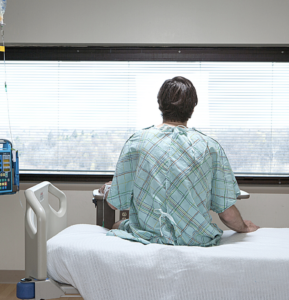
Almost every patient asks me this same question, how long will I be in the hospital after surgery? Makes sense right? Your family needs to know how to plan, who to call, and to arrange logistics. Being in a hospital is not something we experience in our daily life. It can seem intimidating! The bottom line is that how long you spend in the hospital after surgery really depends on the type of surgery that you are having. Forgive the obvious bypass there, but its true. Everyone is a little bit different, and different individualized conditions really dictate how your hospital stay goes.
Generally speaking, however, a patient of mine undergoing a craniotomy for removal of a brain tumor typically goes home the next day. With minimally invasive techniques and endoscopic approaches, I disrupt less of the surrounding tissues which means less pain, quicker recoveries and generally happier people who can get out of the hospital even sooner that they might have in the past. The basic benchmarks for leaving the hospital include a variety of parameters, but often that your neurologic exam and brain function are stable, that you are able to eat, take care of basic personal care maybe even with some help, and to be capable of doing activities that allow you to function at home. Of course you may need some assistance, and we have extensive experts from occupational and physical therapists to case managers that makes sure a transition out of the hospital is safe and sets you up for optimal healing.
Likewise for pituitary surgery, my patients also typically are going home the next day. For these patients I really want to make sure they are likewise doing neurologically well, that hormone function and electrolytes are stable, and that we have good follow-up and care plans for both sinus and nasal passage care, endocrinology follow-up and close follow-up with my office. For patients with hormone producing tumors such as Cushing’s Disease, Acromegaly, and even Prolactin oversecreting pituitary tumors, we occasionally need to do additional lab tests to confirm the hormone status of the patient after surgery and to guide additional care. But broadly speaking patients are going home the next day.
Naturally everyone is a little different, and every situation, operation and circumstance is different. You ultimately have to talk with me or your provider about the exact circumstances but hopefully this gives you an idea.
As always, reach out if you’d like a second opinion or another set of eyes on your condition, or that of a loved one. Happy to help.
_/\_
Patrick
Important Disclaimer:
The medical information on this site and within all video, audio, written material and all associated content is provided as an information resource only and is not to be used or relied on for any diagnostic or treatment purposes. This information is not intended to be patient education, does not create any patient-physician relationship, and should not be used as a substitute for professional diagnosis and treatment. Please consult your health care provider before making any healthcare decision or for guidance about a specific medical condition. Dr. Patrick Codd and all affiliates shall have no lability, for any damages, loss, injury, or liability whatsoever suffered as a result of your reliance on the information contained in this site or material.

comments +